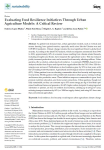Lopez-Muñoz F., Soto-Bruna W., Baptiste B.L.G., Leon-Pulido J. (2025). Evaluating food resilience initiatives through urban agriculture models: a critical review. Sustainability, 01/04/2025, vol. 17, n. 7, p. 2994.
https://doi.org/10.3390/su17072994
https://doi.org/10.3390/su17072994
| Titre : | Evaluating food resilience initiatives through urban agriculture models: a critical review (2025) |
| Auteurs : | F. Lopez-Muñoz ; W. Soto-Bruna ; B.L.G. Baptiste ; J. Leon-Pulido |
| Type de document : | Article |
| Dans : | Sustainability (vol. 17, n. 7, April 2025) |
| Article en page(s) : | p. 2994 |
| Langues : | Anglais |
| Langues du résumé : | Anglais |
| Catégories : |
Catégories principales 06 - AGRICULTURE. FORÊTS. PÊCHES ; 6.4 - Production Agricole. Système de ProductionThésaurus IAMM SYSTEME DE PRODUCTION ; AGRICULTURE URBAINE ; RESILIENCE ; SECURITE ALIMENTAIRE ; CRISE ; CHANGEMENT CLIMATIQUE |
| Résumé : | As global food demand rises, urban agriculture models, such as vertical and terrace farming, have gained traction, especially amid crises like the Ukraine war and COVID-19 pandemic. Climate change remains the most significant threat to global food security. According to the latest FAO analysis, which encompasses assessments from 1990 to 2023, approximately 40% of economic losses resulting from climate-related hazards, including droughts and floods, have impacted the agriculture sector. This has reduced yields, increased production costs, and worsened food insecurity, affecting millions. Urban gardens offer a solution, enhancing food resilience. A systematic PRISMA-based review analyzed studies from Scopus and reports from organizations like the FAO. Over 3329 documents were reviewed. Publications on food resilience grew by 50% in four years, with the US leading with 700 projects. Agricultural and biological sciences dominate research (45%). Urban gardens focus on educating communities about food security and improving food systems. Mobile gardens with portable labs maximize urban spaces, turning rooftops and terraces into productive areas. These initiatives empower communities to grow food, promote nutrition education, and foster social connections. Urban gardens, though not fully sustainable, as they can consume up to 35% more energy per kg of food than optimized traditional farms and generate a 20-40% higher carbon footprint if using imported substrates or plastics, are key for resilient food systems, yielding up to 20 kg/m2/year, reducing transport emissions by 68% (vs. 2400 km supply chains), and using 90% less water than conventional agriculture. |
| Cote : | En ligne |
| URL / DOI : | https://doi.org/10.3390/su17072994 |







